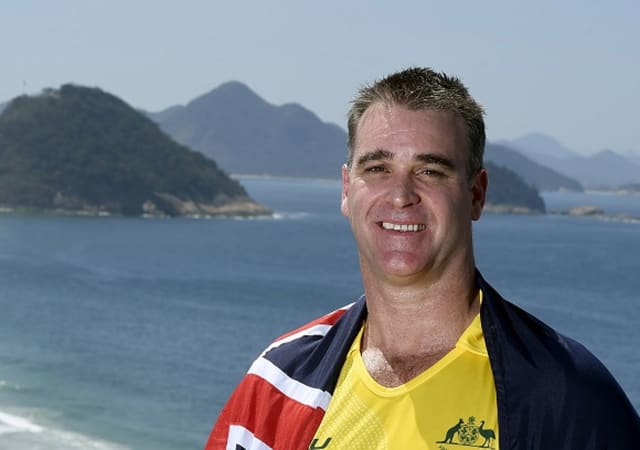Paralympic Men - Will it be the USA and Great Britain for gold this year?
Rio de Janeiro (Rio 2016 Paralympic Games) - The 15th Paralympic Games begin today in Rio de Janeiro and there’s good reason for a number of teams to feel optimistic. At least four teams could win it all.
Rio de Janeiro (Rio 2016 Paralympic Games) - The 15th Paralympic Games begin today in Rio de Janiero and there’s good reason for a number of teams to feel optimistic.
The men’s tournament will see at least four teams with a better than average chance to take the gold medal and another three capable of making life miserable for the first four on any given day.
If you're Canada or Australia, that confidence comes from both being in the final for the past three Paralympics. But both of those teams have seen significant roster changes says Dan Johnson, who played in three Paralympics for Great Britain.
For the men I think this is the most open tournament there’s been for many Paralympics. - Johnson
Reason number one for Johnson, who will provide commentary for the U.K.’s Channel 4 during the games, is the dramatic change in the Canadian lineup, giving the defending champions a much different look and personality. "With the retirement of three all-time greats, (Joey) Johnson, (Patrick) Anderson and (Richard) Peter, there’s no clear favorite."
The new look Canada still has the experience and understanding of what it takes to win in David Eng, Adam Lancia and Bo Hedges but the question is whether or not their very talented newcomers, Nic Goncin and Liam Hickey.
He adds that the Australians, silver medalists in London and Athens with gold from Beijing, might argue that they should still be considered the team to beat in spite of the fact that they’ve also taken a hit in the retirement of stalwarts such as Justin Eveson and Michael Hartnett. They are also the reigning IWBF World Champions from 2014.
In the mix with a proud Australia and yet to be determined Canada are the two teams sporting red, white and blue, the United States and Great Britain, two sides tired of fighting for third.
These traditional rivals have met in the bronze medal game in three of the last four Paralympics with the Americans winning twice. The first one in Sydney, won at the buzzer on a three-pointer by the American Paul Schulte was particularly painful for Johnson who was playing his last tournament for the Brits.
Four years later in Athens, Great Britain knocked the USA out in the quarterfinals and then beat them for bronze in Beijing. The USA reversed that in London.
The Americans have not been atop the podium since 1988 in Seoul and Great Britain has never been there. Since two silver medals in the first two Paralympic Games in 1960 and 1964, the only other final appearance for the Brits was in 1996.
"The USA have been looking good in all the prelims, a very talented team with a completely different style of basketball than the Aussies play with the mid-range, all-court game."
 Australia captain Brad Ness was chosen to be flag bearer at the opening ceremony of the Rio 2016 Paralympic Games. Photo courtesy of the Australia Paralympic Committee.
Australia captain Brad Ness was chosen to be flag bearer at the opening ceremony of the Rio 2016 Paralympic Games. Photo courtesy of the Australia Paralympic Committee.
Steve Serio runs the offense, creating shots for proven scorers including Matt Scott, Josh Turek and Michael Paye, but also for himself. Coach Ron Lykins has a lot of other options with Brian Bell, Trevon Jenifer and Nate Hinze. Seven of his players are under 30 and only two over 33.
Indeed, the Americans are built for speed and relentless pressure unlike the halfcourt games of the Aussies and Brits. It didn’t fare well for Canada either as the Americans destroyed their norther neighbors in last summer’s Parapan American Games in Toronto.
Just behind the U.S. are GB and a pack (including) Germany, Turkey, and Spain.
While these are teams with some very talented players, most of their core players are closer to the end of their careers than the beginning. Depth is also an issue.
"With Turkey you never know quite how good they’re going to be," says Johnson, noting that the Turks can be a bit mercurial as they were in the last World Championships, where they were up by 22 at the half on Australia.
"On their day, they’re a dangerous team."
Group A for the men features Canada and Australia, along with Turkey, the Netherlands, Japan and Spain. The London bronze medalists USA and fourth place Great Britain headline Group B with Iran, Germany, Algeria, and hosts Brazil.
If form holds, the crossovers may put the USA and GB once again against each other for a medal. The question will be, what color?
"I think if you asked both teams in years gone by were they happy with that bronze medal, I think they would have said yes," says Johnson. "I think if they come away with a bronze medal in this tournament, both of them will be disappointed."
FIBA